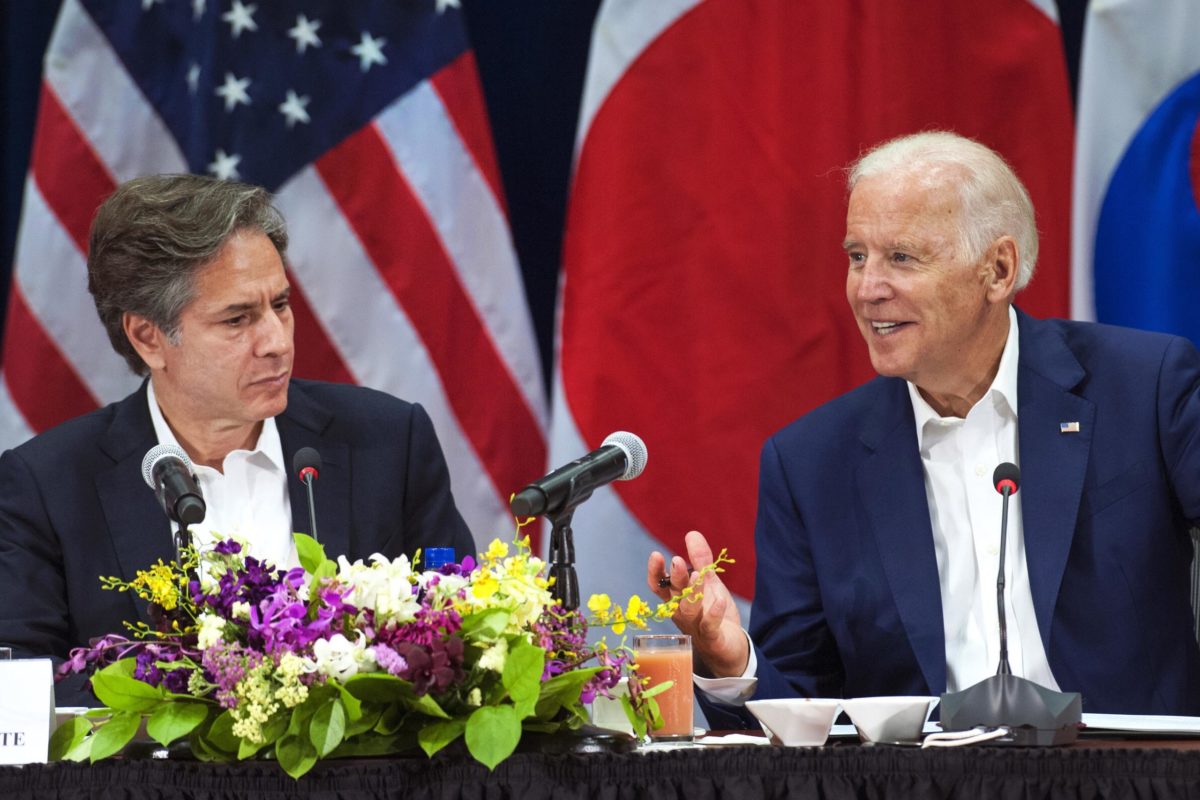Seven questions for Tony Blinken
A range of experts offer their own suggestions for the questions Blinken should face in his confirmation hearing for secretary of state

Staff Sgt. Chris Hubenthal/U.S. Air Force
Vice President Joe Biden talks to South Korean and Japanese leaders alongside Deputy Secretary of State Antony Blinken during trilateral talks at the Defense Department’s Daniel K. Inouye Asia-Pacific Center for Security Studies in Honolulu, July 14, 2016.
All eyes will be on Tony Blinken this afternoon when President-elect Joe Biden’s choice for secretary of state will testify in front of the Senate Foreign Relations Committee. Jewish Insider asked a handful of readers and experts: “What is one question you would ask Tony Blinken at his confirmation hearing?”
Aaron David Miller, senior fellow at the Carnegie Endowment for International Peace: “As part of an effort to facilitate normalization between Israel and the Arab states, the Trump administration made certain commitments to [the United Arab Emirates], Sudan and Morocco. Will the Biden administration abide by those commitments, especially U.S. recognition of Morocco’s sovereignty over Western Sahara even though it contradicts established U.S. policy?”
Danielle Pletka, senior fellow at the American Enterprise Institute: “Mr. Blinken, do you know Xiyue Wang? He was a pro-détente-with-Iran student of history from Princeton arrested by the Islamic Republic of Iran during the Obama administration. He was released from Evin Prison after 40 months after a prisoner swap with the United States. In a recent speech, he said, ‘I thought that the Iranian regime’s hostility against the United States was exaggerated… I believed that U.S. foreign policy itself was the problem.’ He learned otherwise. Do you believe you can dissociate hostage taking from Iranian support for terrorism from missile technology and Iran’s nuclear program? Or do you insist on the conceit of the JCPOA — that all these issues can be split apart and solved — or not — separately?”
Michael Koplow, policy director of Israel Policy Forum: “The Abraham Accords are an important and welcome development, but nearly every normalization accord that has been signed has come with a large price tag that the U.S. has paid, be it arms sales or American diplomatic moves in completely unrelated spheres. What is the Biden administration’s plan to strengthen and expand Israel’s integration in the region without having to make U.S. policy concessions as incentives on issues that have nothing to do with bilateral ties between Israel and Arab states?”
Tevi Troy, former deputy secretary of Health and Human Services: “How do you plan to manage relations with Climate Czar John Kerry? He is a former secretary of state himself, which complicates matters, and the experience of two senior people at State Department with cabinet rank did not work out well with John Foster Dulles and Harold Stassen during the Eisenhower administration. In a related vein, will Kerry have any say over Middle East policy, given how wrong he was in his adamant prediction that there can be ‘no separate peace between Israel and the Arab world’ without the Palestinians on board?”
David Harris, CEO of the American Jewish Committee: “What’s the strategy for re-entering talks with Iran, mindful of Iran’s persistently malign behavior? Will [the] Biden team honor the various U.S. pledges made in the Abraham Accords? Do you support [the] IHRA working definition of antisemitism?”
Ileana Ros-Lehtinen, former Republican congresswoman: “I would like Secretary Blinken to give our Cuban exile community in South Florida a clearer idea of what his vision is for a U.S.-Cuba relationship under the Biden administration. Folks believe that President Biden will simply turn back the clock with no consideration given to the fact that the regime on the island has not allowed for freedom, democracy and human rights to flourish at all. They worry that concessions will be made to the communist regime without having it change one bit toward a country that allows freedom of expression. The South Florida Cuban exile community hopes and prays for no rewards to an outlaw regime. Can he please speak to this anguish?”
William Daroff, CEO of the Conference of Presidents of Major American Jewish Organizations: “The JCPOA focused solely on nuclear issues. However, Iran violates norms and values on arms proliferation, ballistic missiles, the global sponsorship of terrorism, and human rights abuses. Shouldn’t any new negotiations be comprehensive in scope in order to stop the regime’s harmful activities across multiple fronts?”









